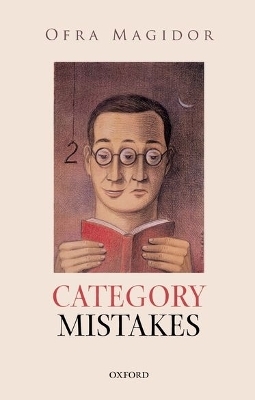
Category Mistakes
Seiten
2016
Oxford University Press (Verlag)
978-0-19-877926-1 (ISBN)
Oxford University Press (Verlag)
978-0-19-877926-1 (ISBN)
Category mistakes are sentences such as 'Green ideas sleep furiously' or 'Saturday is in bed'. They strike us as highly infelicitous but it is hard to explain precisely why this is so. Ofra Magidor explores four approaches to category mistakes in philosophy of language and linguistics, and develops and defends an original, presuppositional account.
Category mistakes are sentences such as 'Green ideas sleep furiously', 'Saturday is in bed', and 'The theory of relativity is eating breakfast'. Such sentences strike most speakers as highly infelicitous but it is a challenge to explain precisely why they are so. Ofra Magidor addresses this challenge, while providing a comprehensive discussion of the various treatments of category mistakes in both philosophy of language and linguistics.
The phenomenon of category mistakes is particularly interesting to both these fields because a plausible case can be (and has been) made for explaining it in terms of syntax, semantics, and pragmatics--making it a fruitful case for exploring the relations between and nature of these three fundamental realms of language. Category Mistakes follows this division. After an introduction which explains the aims and motivations for the project and provides a brief historical survey of the (modern) treatment of category mistakes in each of philosophy, linguistics, and computer science, Magidor discusses four approaches in turn: first, the syntactic approach, which maintains that category mistakes are syntactically ill-formed; then two semantic approaches, though ones that appeal to different semantic facets: the meaninglessness view, which maintains that category mistakes are meaningless, and the MBT view, according to which category mistakes are meaningful but truth-valueless; and finally the pragmatic approach, according to which category mistakes are syntactically well-formed, meaningful, truth-valued but nevertheless pragmatically inappropriate. Magidor argues that the first three approaches ought to be rejected, and in the final chapter addresses the main challenge by developing and defending a particular version of the pragmatic approach: a presuppositional account of category mistakes.
Category mistakes are sentences such as 'Green ideas sleep furiously', 'Saturday is in bed', and 'The theory of relativity is eating breakfast'. Such sentences strike most speakers as highly infelicitous but it is a challenge to explain precisely why they are so. Ofra Magidor addresses this challenge, while providing a comprehensive discussion of the various treatments of category mistakes in both philosophy of language and linguistics.
The phenomenon of category mistakes is particularly interesting to both these fields because a plausible case can be (and has been) made for explaining it in terms of syntax, semantics, and pragmatics--making it a fruitful case for exploring the relations between and nature of these three fundamental realms of language. Category Mistakes follows this division. After an introduction which explains the aims and motivations for the project and provides a brief historical survey of the (modern) treatment of category mistakes in each of philosophy, linguistics, and computer science, Magidor discusses four approaches in turn: first, the syntactic approach, which maintains that category mistakes are syntactically ill-formed; then two semantic approaches, though ones that appeal to different semantic facets: the meaninglessness view, which maintains that category mistakes are meaningless, and the MBT view, according to which category mistakes are meaningful but truth-valueless; and finally the pragmatic approach, according to which category mistakes are syntactically well-formed, meaningful, truth-valued but nevertheless pragmatically inappropriate. Magidor argues that the first three approaches ought to be rejected, and in the final chapter addresses the main challenge by developing and defending a particular version of the pragmatic approach: a presuppositional account of category mistakes.
Ofra Magidor studied philosophy, mathematics, and computer science at the Hebrew University of Jerusalem, and completed a BPhil (2004) and DPhil (2007) in philosophy at the University of Oxford. Between 2005 and 2007 she was a Junior Research Fellow at Queen's College, Oxford, and since 2007 she has held a tutorial fellowship and CUF lectureship in philosophy at Balliol College and the University of Oxford. Her research focuses on philosophy of logic and language, as well as related issues in metaphysics, epistemology, and philosophy of mathematics.
1: Introduction
2: The Syntactic Approach
3: The meaninglessness view
4: The MBT view
5: The Pragmatic Approach
References
Index
| Erscheinungsdatum | 20.05.2016 |
|---|---|
| Reihe/Serie | Oxford Philosophical Monographs |
| Verlagsort | Oxford |
| Sprache | englisch |
| Maße | 137 x 217 mm |
| Gewicht | 238 g |
| Themenwelt | Geisteswissenschaften ► Philosophie ► Sprachphilosophie |
| Geisteswissenschaften ► Sprach- / Literaturwissenschaft ► Sprachwissenschaft | |
| ISBN-10 | 0-19-877926-7 / 0198779267 |
| ISBN-13 | 978-0-19-877926-1 / 9780198779261 |
| Zustand | Neuware |
| Haben Sie eine Frage zum Produkt? |
Mehr entdecken
aus dem Bereich
aus dem Bereich
Aspekte einer Ontologie des Logos
Buch | Hardcover (2024)
Springer Fachmedien (Verlag)
119,99 €
Wie die Menschheit zu ihrer größten Erfindung kam
Buch | Softcover (2022)
C.H.Beck (Verlag)
18,00 €
Macht und Legitimität politischer Sprache im Prozess der europäischen …
Buch | Softcover (2023)
Nomos (Verlag)
74,00 €


